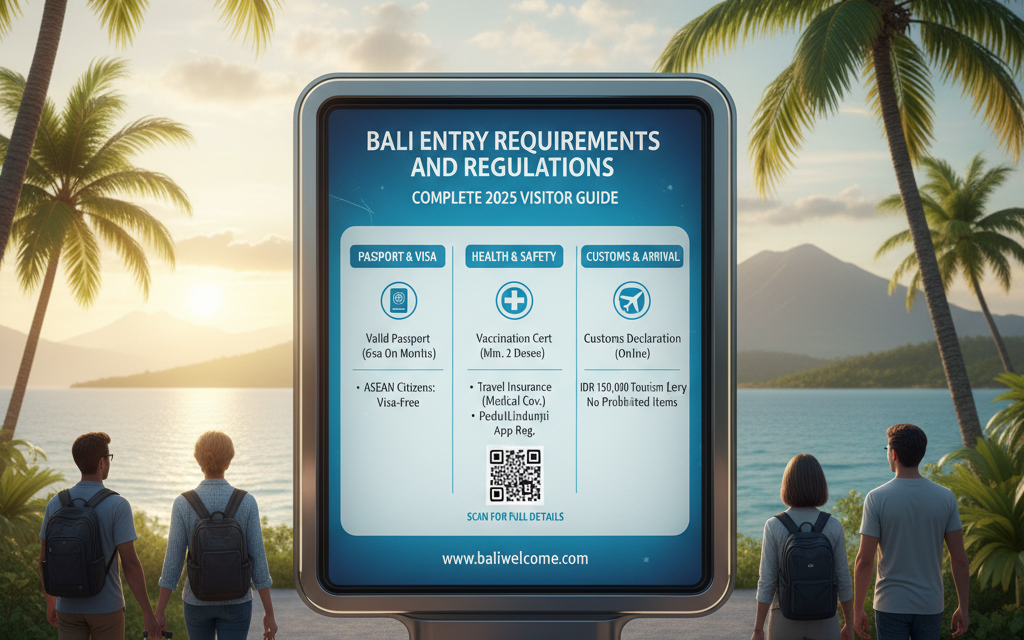
Planning a trip to Bali requires understanding the island’s comprehensive entry requirements and visitor regulations. Following Governor Wayan Koster’s re-election and the implementation of updated guidelines, international tourists must navigate new rules designed to preserve Bali’s cultural integrity and promote sustainable tourism.
Visa Requirements
Visa-Free Entry
Limited to: Citizens of 9 ASEAN countries and Timor-Leste
Duration: Up to 30 days
Extension: Not available
Visa on Arrival (VoA)
Eligible countries: 86 nations including the United States, Australia, Canada, UK, and most European countries
Cost: $35 USD
Duration: 30 days
Extension: Can be extended once for an additional 30 days (60 days total)
Payment: Cash (USD or IDR) at designated counters upon arrival
Electronic Visa on Arrival (eVOA)
Application: Online via the Indonesian Immigration Portal
Timeline: Apply up to 90 days before travel
Cost: IDR 500,000 (approximately $35 USD)
Advantages: Streamlined airport procedures, shorter queues
Extension: Same as standard VoA – one 30-day extension available
Pro Tip: The eVOA significantly reduces arrival wait times at Ngurah Rai International Airport, which can be congested during peak hours.
Verification
Always verify your country’s eligibility through the official Indonesian Immigration Portal. Avoid third-party websites that may charge additional processing fees for what is a straightforward online application.
Mandatory Tourist Levy
Amount: IDR 150,000 (approximately $10 USD)
Payment portal: lovebali.baliprov.go.id
When to pay: Prior to arrival or upon arrival at designated airport counters
Purpose: Funds cultural preservation projects, infrastructure improvements, and environmental protection initiatives
This levy is mandatory for all international visitors regardless of visa type. Keep your payment receipt as proof may be requested during your stay.
Circular Letter No. 7 of 2025: Key Obligations
Governor Koster’s updated regulations establish clear requirements for all foreign tourists:
Cultural and Religious Respect
Temple Access
- Visitors may not enter temple inner sanctums (utama mandala) unless participating in prayer
- Traditional Balinese attire (sarong and sash) required for temple visits
- Menstruating individuals are prohibited from entering sacred areas per traditional customs
- Respect for ongoing ceremonies and religious activities mandatory
Appropriate Behavior
- Modest dress required at religious sites and in villages
- Respectful behavior during cultural ceremonies
- No climbing on sacred statues or structures
- Photography restrictions at certain temples must be observed
Environmental Responsibility
Strict Prohibitions
- Littering anywhere on the island
- Use of single-use plastics
- Damage to coral reefs or marine life
- Picking or damaging plants in protected areas
Enforcement: Violations result in fines and potential deportation
Financial Compliance
Currency Requirements
- All transactions must use Indonesian Rupiah (IDR)
- Mandatory use of QRIS payment system for digital transactions
- Money exchange restricted to licensed providers only
- ATM withdrawals from authorized banks
Why it matters: These requirements combat fraud, support the formal economy, and ensure visitor financial security.
Legal and Safety Requirements
Licensed Services
- Must hire licensed tour guides for cultural and heritage sites
- Accommodations must be officially registered
- Rental vehicles must come from licensed providers
- Drivers must hold valid international or Indonesian driver’s licenses
Traffic Regulations
- International driving permits required for vehicle operation
- Helmet mandatory for scooter riders (driver and passenger)
- Adherence to Indonesian traffic laws
- No driving under influence of alcohol or drugs
Additional Prohibitions
The regulations establish eight core prohibitions:
- Sacred space violations – Entering temple inner sanctums improperly
- Disrespectful behavior – Actions that dishonor Balinese culture or religion
- Environmental damage – Littering, reef damage, wildlife harassment
- Illegal substances – Possession or use of drugs (penalties are severe)
- Unlicensed activities – Working without proper permits
- Currency violations – Refusing to accept IDR or using unlicensed money changers
- Traffic violations – Driving without proper documentation
- Disruptive behavior – Creating public disturbances or engaging in offensive conduct
Health Requirements
Routine Documentation
As of November 2025, standard health documentation requirements include:
- Valid health insurance covering medical expenses in Indonesia
- Proof of sufficient funds for duration of stay
- Return or onward ticket confirmation
SATUSEHAT App
Indonesia’s health tracking app may be required depending on current health regulations. Check official sources for the latest requirements before departure.
Arrival Process at Ngurah Rai International Airport
Step 1: Immigration
- Present passport with minimum 6 months validity
- Show return/onward ticket
- Present eVOA confirmation (if applicable) or pay for VoA
Step 2: Tourist Levy
- Pay IDR 150,000 at designated counters if not paid online
- Keep receipt for potential inspection
Step 3: Customs
- Declare items exceeding duty-free allowances
- Prohibited items include drugs, weapons, and excessive amounts of certain goods
Step 4: Exit
- Proceed to ground transportation or accommodation
Best Practices for Compliance
Before You Travel
- Apply for eVOA online 1-4 weeks before departure
- Pay tourist levy online through official portal
- Obtain international driving permit if planning to drive
- Purchase comprehensive travel insurance
- Download offline maps and important contact information
During Your Stay
- Carry copies of important documents (passport, visa, levy receipt)
- Keep payment receipts from licensed tour operators
- Photograph your rental vehicle documentation
- Maintain appropriate dress near religious sites
- Use only licensed taxis or ride-sharing apps
Cultural Sensitivity
- Learn basic Indonesian and Balinese phrases
- Understand left hand is traditionally considered unclean
- Ask permission before photographing people or ceremonies
- Remove shoes when entering temples and homes
- Accept and offer items with right hand
Penalties for Violations
Violations of the new regulations can result in:
- Monetary fines (amounts vary by offense)
- Deportation and entry ban
- Criminal charges for serious offenses (drugs, violence, major cultural violations)
- Detention during investigation
Drug offenses in particular carry extremely severe penalties, including lengthy prison sentences and potential death penalty.
Special Considerations for November 2025
Wet Season Preparations
- Road conditions may be affected by rain
- Some rural areas may experience temporary access issues
- Increased mosquito activity (ensure proper repellent and coverage)
- Flash flood awareness in certain regions
Festival Attendance
- Ubud Writers & Readers Festival (late October through early November) creates accommodation pressure
- Pemuteran Bay Festival (November 6-8) attracts visitors to north Bali
- Book accommodations well in advance for festival periods
Resources and Contacts
Official Information
- Indonesian Immigration: https://www.imigrasi.go.id
- Tourist Levy Payment: lovebali.baliprov.go.id
- Bali Tourism Office: disparda.baliprov.go.id
Emergency Contacts
- Police: 110
- Ambulance: 118
- Fire: 113
- Tourist Police (Denpasar): +62 361 224111
Embassies and Consulates Keep contact information for your country’s diplomatic mission in Indonesia. The nearest embassy may be in Jakarta, but many countries maintain consular presence in Bali.
Changes from Previous Years
The 2025 regulations represent strengthened enforcement of existing principles rather than entirely new requirements. Key changes include:
- Stricter enforcement of licensed guide requirements
- Enhanced monitoring of environmental violations
- Expanded QRIS payment requirements
- Increased penalties for cultural disrespect
- Better coordination between immigration and local authorities
Making Compliance Easy
Rather than viewing these requirements as burdensome, consider them an invitation to engage more meaningfully with Bali’s culture:
- Licensed guides provide deeper cultural insights
- Temple dress requirements create respectful engagement
- Environmental protections preserve the beauty you came to see
- Financial regulations protect you from scams
The Big Picture
Bali’s comprehensive regulations reflect a destination choosing quality over quantity, sustainability over exploitation. The island welcomes visitors who respect its unique culture and environment while taking steps to deter those seeking it merely as a “playground for excess.”
For travelers willing to engage respectfully and responsibly, these requirements pose no barrier. Instead, they create a framework for authentic, meaningful experiences while supporting Bali’s long-term preservation.
As tourism continues recovering and evolving post-pandemic, Bali positions itself as a leader in sustainable, culturally-rooted tourism. Compliance with these regulations isn’t just a legal requirement – it’s participation in protecting one of the world’s most precious cultural landscapes for future generations.
Come prepared, stay respectful, and discover why Bali remains one of the world’s most captivating destinations for those who approach it with the spirit it deserves.






